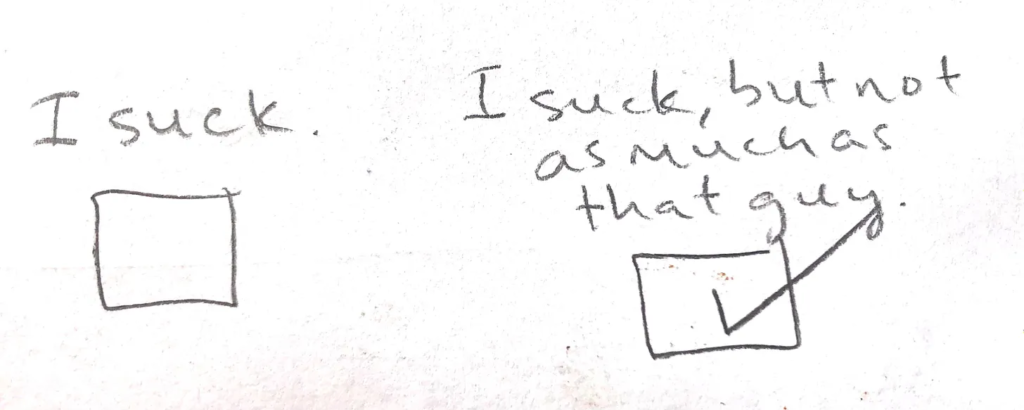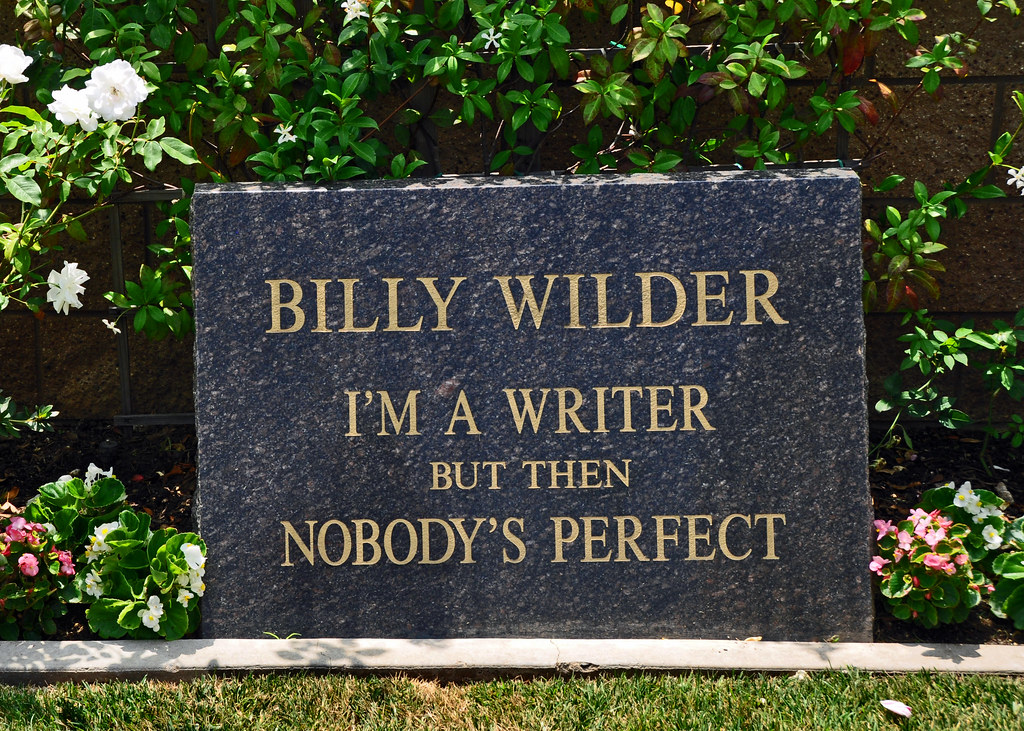Two Approaches Analyzed…

As they say*, don’t ask for permission; ask for forgiveness.
Sometimes the biggest block to writing is thinking that you can’t imagine you’d be able to write anything useful. People who are sensitive enough to write well are often prone to this, but there’s a way around it.
The flipside of this is that you may actually think that everything that you produce is going to be amazing and world-changing.
Let’s get real for a moment: neither of these is true. What is true is that it feels great to have someone compliment your work. What is true is that sometimes even writing itself feels great (not always, but sometimes).
What is true is that everyone has a horrible time actually sitting down to do work. Why lie about it? A solid 80% of writing is avoiding writing.
It’s not easy, but it’s certainly not willpower or inspiration that leads to getting writing done. Often it’s just that an idea is bothering you and you need to find a way to flesh that idea out, or to explore it more fully. In a sense, it is exorcising the demon from your mind.
This is difficult to do well without technique and practice, but at the same time it is vitally important simply to express oneself on the page. It is much healthier to get ideas out of the head so they don’t sit there and fester and become the life you never lived, or the thing you gave up to “do something responsible with [your] life.”
There are few things that help writing and getting stuff out. We’ll start with the most important thing to realize.
I. Discipline and Habit, NOT Inspiration
Inspiration is to generate ideas, not to develop ideas. If you have to wait until you have an idea burning a hole in your mind before you write, you’ll never develop the technique to make anything good on a consistent basis.
Every once in a while, of course, something might pop out, but without technique it’s doubtful that you’d even be able to edit some “inspired” piece of work into something reasonable.
No, the key is to set a time to write, or even just to set a timer itself for 20 minutes just to write drivel. Write something. Try to keep a certain time of the day, but that’s really hard so maybe just try getting 15 minutes in each day.
Start by writing about something. Anything. Treat it like Julia Cameron’s Morning Pages—straight free-writing—if you don’t know what specifically to write about.
Inspiration, on the other hand, tends to come in the shower. Or on walks. Or driving. Times when your conscious mind is occupied with something and your unconscious is allowed to roam free. Keep a notebook around to write these ideas or snippets of dialogue or visions of characters or whatever.
You can develop these into a more reasonable form later during your writing.
You can’t force inspiration to come, which is why it makes a terrible way to sit down to do the daily work of writing. In fact, it probably will never be daily because inspiration doesn’t always strike. Some days it just sucks, but it’s like practicing anything: occasionally the most painful days turn out to be the ones that did the most work.
There is a secret technique for meeting the inspiration on its own terms, though: schedule a time when you know you’re going to be writing, and invite the Muse to meet you there. He/she/it might not show, but more often than not, he/she/it does. Ironically enough, the more disciplined you become at writing consistently (ideally for at least 15 minutes each day), the more the Muse tends to show up.
II. Find Something Shit and Do Better
Perhaps my favorite technique for getting over “I’m not good enough at this” is to find something terrible.
If you’re anything like me, it bothers me to go to a professional comedy club and look at the early acts because most of them are absolutely terrible. Now let’s be honest: stand-up is difficult and a lot more than simple gag-writing. I don’t know whether I could outperform these people.
After all, some promoter is paying them for something. That doesn’t mean their jokes are any good, though.
What’s the analogue here? Well, if you’re looking for the film equivalent of “jokes that suck,” there’s a lot to choose from.
Ideally this would be something that is legitimately quite poorly made. It’s not the same as looking at a Rothko and wondering why you couldn’t just go to Home Depot, buy some rollers, mix some black in with the red paint, and go to town.
Rather, try to find something that is legitimately just not that good. Direct-to-video sequels and most low-budget horror are a good place for inspiration. Think about your favorite example of a film that did not achieve its intended effect.
Teenage Mutant Ninja Turtles 3: Turtles in Space might be a place to start. More seriously, though, you can get a lot of mileage out of Ed Wood. Check out Glen or Glenda, or the venerable Plan 9 from Outer Space and try not to fall asleep waiting for Maila Nurmi (the only non-boring part of that whole movie).
There are other famous pieces of garbage like Tommy Wiseau’s The Room, which I would suggest can be improved in many ways, but something that is so bad it is amazing can also be a bit of a headache for this process. You could end up making something definitively better than The Room and it might just be pointless. It might get zero traction. People wouldn’t still be watching it at midnight 20 years after it came out.
The one that I’m still struggling to improve is Donnie Darko. I really don’t think it’s a particularly good script, but the film has does have quite a few things to recommend it.
People still love it despite it being a bit shit. I have a sneaking suspicion that there’s a degree of innocence and naïveté in the writing of the film that my cynical mind wouldn’t be able to replicate and I’d end up fixing the flaws only to realize that my version is really something really boring and uninspired.
What you’re ultimately trying to do here is to scale up: find something terrible and do better, then find something less terrible and do better, rinse and repeat. Do this over and over, trading up the chain, until you achieve something that is better than a film that’s actually pretty decent.
The key here is to pick the greatest example of your particular genre and work toward that while stepping over the poorer, crappier films. You’ll likely never get to the level of the great one–at least not for a few scripts yet–but it’s a lot of fun trying.
A good rule of thumb is this: it’s not perfect, but it’s objectively better than Film X (or, for that matter, Ti West’s hilariously overrated film X), and I’m fairly convinced that Person Y would agree with me about that. Part of this is to be knowledgeable enough about film to pick reference films well: one to strive toward, and one you could clearly do better than.
For example, researching a script on taxi driving, I could look at Spree as a bad movie (not even that terrible, but not great) and Taxi Driver as an unapproachably good film. I probably won’t reach Taxi Driver and that’s OK. Spree, on the other hand, I’m quite convinced is not nearly as good as my script. That gives me confidence in my script. Ego boost!
Your aim: be better than the one that’s crap, and look to the good one for inspiration. Just make sure you don’t copy the bad one too closely (because it’s bad!). The good one, you might be able to get away with copying bits from–it’s likely that even if you do try to copy, your interpretation will be different enough that it wouldn’t be plagiarism in the traditional sense. More on that later, but in short, there’s no point in reinventing the wheel with every script. If you need a plot mechanism, use it. If someone asks you about it, tell them you did it as an homage to the script you took it from!
The major point here is that when you work like this, you are forced to figure out what makes movies tick. What works and what doesn’t. What got this film made?
This is a lot easier to do with some consistent tools. We’ll talk a lot more about this in the near future.
Consistently aim to be better than the one who’s crap, but look to the one who’s good for inspiration. Make sure you don’t copy the bad one. That said, figure out what makes it tick. What got this film made?
Conclusion
Essentially, you want to work in a certain way: find a middle path between 1) the person who buys a toilet with a shelf in it because they think everything that comes out is glorious and needs to be shown to the world and 2) the person who might be really good but never gets anywhere because she starts self-flagellating before the work even begins.
*Who is “they?” Usually tech bros, but we’ll let that slide.




